
Household pests pose significant health risks, particularly for those with allergies or asthma. Here, we address common pests responsible for allergic reactions, their symptoms, and control methods to reduce exposure and prevent infestations.
Among the insects that are most likely to cause allergies are bedbugs, wasps, cockroaches, and dust mites. Find out more about the stings and bites of bugs that may cause allergies.
Table of Contents
How to tell if you’re allergic to bug bites?
For many, a bug bite will cause minor swelling. However, if the swelling is unusually large or spreads, this could indicate an allergy. Allergic reactions often cause swelling, redness, or itchiness at the bite site shortly after the bite or sting. While some redness and itching are normal, an allergic reaction will typically be more intense and may spread beyond the bite area.
Allergic reactions can trigger hives, which are red, itchy welts on the skin. These may appear around the bite or even spread to other body parts. Rashes can also develop, resembling clusters of red, raised bumps.
In rare cases, a bug bite or sting can trigger anaphylaxis, a life-threatening reaction. Symptoms include swelling of the throat or tongue, a rapid pulse, drop in blood pressure, and loss of consciousness. Anaphylaxis requires immediate emergency care, often involving an injection of epinephrine (EpiPen).
Children or young adults are also more likely to develop allergies when in regular contact with some household pests. With symptoms ranging from a runny nose to more life-threatening anaphylaxis shock, it’s vital to keep pests to a minimum.
Dust mites allergies
If you suffer from a dust mite allergy, your problem is caused by the proteins that are contained in the droppings and dead bodies of the dust mites in your home.
Symptoms of a dust mite allergy
When dust mites enter your body, they can trigger an allergic reaction which may cause inflammation in your nose, lungs, and eyes. The symptoms are similar to the symptoms of pollen allergies. You should consult with a doctor to be sure which one you have.
These allergies usually peak in summer. Regular exposure will only exacerbate the symptoms and lead to long-lasting damage to your health.
Dust mites allergy treatment
Unfortunately, dust mites aren’t something you can simply get rid of. They reside in dust and are basically everywhere. They can be mostly found in your bed as they very much enjoy feeding on your dead skin cells.
The best thing you can do to get rid of dust mites is to limit your exposure to dust. Regular cleaning might significantly fix your condition. You can also call a professional pest control team to kill all dust mites in your bed, guaranteeing a dust-mite-free bed for the next two months.
Check also:
Are you dealing with a pest infestation? You don't have to be alone in the battle against pests. Hire a professional pest expert!
Cockroach allergy
Unlike dust mites, cockroach allergies are not seasonal and can turn into chronic illnesses. If you suffer from a cockroach allergy, it’s usually their faeces, saliva, and dead bodies that lie at the root of the problem.
Symptoms of cockroach allergies
If you have a cockroach allergy, the symptoms would be coughing, nasal congestion, sinus infection, ear infection, wheezing, and skin rashes.
Asthma sufferers are far more likely to have exacerbated symptoms and will be troubled by itchy skin, throat, nose, and eyes. They will also have problems breathing. Cockroaches have even been known to trigger asthma attacks.
How do you treat a cockroach allergy?
Always see a doctor when suspecting an unusual allergy. The best way to avoid this allergy is, of course, by keeping these evil creatures away from your home. Call cockroach pest control to get rid of the fiendish insects for good. Afterwards, try to keep your house clean, fix any pipe leaks, and fill in any structural cracks in your property.
Check also:
Wasp sting allergic reaction
Wasp stings can cause allergic reactions if the body’s immune system reacts too strongly to proteins in the venom. If you have a wasp allergy, a single sting can become life-threatening. Sufferers always carry medication in the form of an epinephrine shot. If you have been stung by a wasp before and it wasn’t a big deal, you might think you are safe. However, one thing people don’t know is that this allergy can be acquired over time.
Symptoms of wasp sting allergies
The instant sharp pain in the stung area, the red welt, and the resulting swelling is a normal reactions of a wasp sting and are not usually dangerous. However, you should start feeling wary if the swelling continues for the next few days.
Severe symptoms include nausea, weak pulse, dizziness, difficulty breathing, and loss of consciousness. In this case, you should immediately get to a hospital as your life will depend on the actions you will take in the next 15 minutes.
What is the best way to treat a wasp sting?
Use soap and water to wash the area well. To reduce swelling and pain, wrap an ice pack in a clean, thin cloth. You can reduce the likelihood of being stung by taking a few precautions. Firstly, always brush the wasps off your body rather than trying to swat them. Secondly, don’t wear bright clothing or use powerful perfumes. Third, don’t expose your skin when you’re outside, if possible. Finally, make sure to book a wasp nest removal service to get rid of all the stingers.
Check also:
There are plenty of wasp sting treatments available both over the counter and from a doctor, but the most effective way of dealing with any symptoms is by removing the problem.
If you’re dealing with a pest infestation, don’t be tempted to tackle it yourself. Reduce the chances of triggering a health-threatening allergy by calling for professional help straight away.
How long does an insect bite allergy last?
An insect bite allergy can last anywhere from a few hours to several weeks, depending on the severity of the reaction and the type of insect involved.
For most people, mild itching, redness, and swelling around the bite usually subside within a few hours to a day. Applying ice or taking antihistamines can help reduce symptoms.
Get help with How to Treat Insect Bites
In cases where there is more noticeable swelling, redness, or discomfort extending beyond the bite area, symptoms may last a few days to a week. This is common with larger local reactions, such as those caused by bee or wasp stings, where swelling can spread around the bite site.
It is rare for allergic reactions to insect bites to last longer than a few weeks, but they can sometimes last for months. Consult a doctor in this case.
Image source: Juta/shutterstock.com





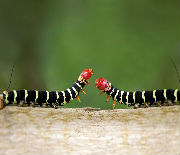
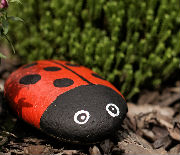
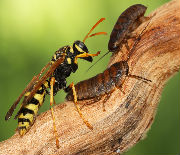
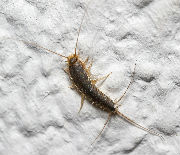
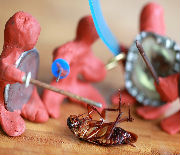
Leave a Reply